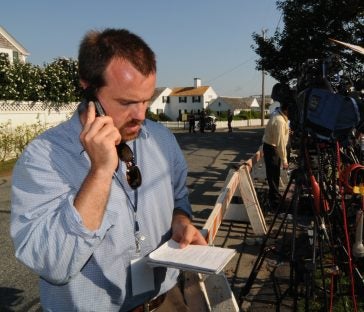 Patrick Cassidy’s unique career path has taken him from Peace Corps volunteer in Cape Verde to news editor at the Cape Cod Times. “Like most people’s lives, it was as much of an accident as anything,” said Cassidy, a veteran reporter and three-time winner of the New England Newspaper and Press Association’s highest honor, Journalist of the Year.
Patrick Cassidy’s unique career path has taken him from Peace Corps volunteer in Cape Verde to news editor at the Cape Cod Times. “Like most people’s lives, it was as much of an accident as anything,” said Cassidy, a veteran reporter and three-time winner of the New England Newspaper and Press Association’s highest honor, Journalist of the Year.
Cassidy has covered a wide variety of stories during his 12 years at the Cape Cod Times, including Cape Wind, the nation’s first proposed offshore wind farm, and a series on climate change.
In 2010, in an effort to better understand the science behind the stories he covered, Cassidy participated in Metcalf Institute’s 12th Annual Science Immersion Workshop for Journalists. Through informal conversations with other journalists, Cassidy learned he wasn’t the only reporter who struggled to meet daily deadlines while attempting to do more long-term research on stories.
“You don’t have all day, every day, to spend reporting on super cool science, or interesting environmental stories, or hard hitting investigative stories,” explained Cassidy of obstacles journalists face in their quest to do more in-depth, scientific reporting.
During the workshop, Cassidy talked about time management challenges with his peers and learned that many of the Fellows struggled with the same issues. “I came back to the paper and looked at those challenges a little differently,” reflected Cassidy. “It helped all of us realize that we weren’t alone,” he added.
Cassidy used some of the insights gained from the workshop to manage his daily workload during his coverage of the unsuccessful effort by Cape Wind to site a wind energy farm off the coast of Cape Cod. He won accolades for his in-depth reporting on Cape Wind, while also managing to juggle his regular beats covering the town of Barnstable, county government, utilities, transportation, electricity, and breaking news.
Years later, when he and his colleagues collaborated on a series exploring the impacts of climate change on Cape Cod, Cassidy confronted what he considers to be the second major obstacle facing journalists. The success of the series hinged on his ability to “explain to the public why they should even care,” said Cassidy. Drawing on conversations he had had with scientists during the Metcalf workshop, Cassidy and his colleagues were able to explain climate change research in ways that readers could understand and relate to.
“What made it different from all the other stories about far flung places and melting glaciers was that it showed the neighborhood impacts of climate change; how zoning regulations were going to be changing; how flood mapping was done; and what was going to change when they build their homes,” said Cassidy.
Now, as a news editor, Cassidy shares his knowledge with the reporters he mentors and supervises. When asked about his next journalism challenge, Cassidy responded like a true news veteran, “I know what I am going to do today, barely, and that will probably change within the next half hour.”
Read More Alumni Profiles Read More Alumni Profiles